

Ramon Martí on LinkedIn: "2019 Key Issues in Teaching and Learning. By Educause" Standpoint: Using Bourdieu to Understand IE and the Researcher’s Relation with Knowledge Generation. Code, Foucault and Neoliberal Governmentality. For Foucault, Neoliberal governmentality is a particular form of post-welfare state politics in which the state essentially outsources the responsibility for ensuring the 'well-being' of the population.
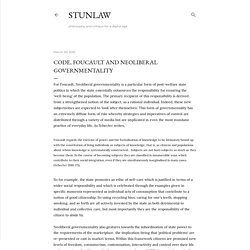
The primary recipient of this responsibility is derived from a strengthened notion of the subject, as a rational individual. Indeed, these new subjectivities are expected to 'look after themselves'. This form of governmentality has an extremely diffuse form of rule whereby strategies and imperatives of control are distributed through a variety of media but are implicated in even the most mundane practice of everyday life. As Schecter writes,
How to Humanize Your Online Class - 2. Anderson, L. W., & Krathwohl, D. R. Language in Conflict - Language in Conflict. This article provides an example of how Critical Discourse Analysis can be used to analyse texts.

By looking at the coverage of a recent news event in two British newspapers, it demonstrates how a number of the linguistic ideas discussed in the How people present the world through language section of the Linguistic Toolbox can be used to produce an in-depth analysis of meaning in texts. Critical Discourse Analysis (CDA) is a branch of linguistics that seeks to understand how and why certain texts affect readers and hearers. Through the analysis of grammar, it aims to uncover the 'hidden ideologies' that can influence a reader or hearer's view of the world. Analysts have looked at a wide variety of spoken and written texts – political manifestos, advertising, rules and regulations – in an attempt to demonstrate how text producers use language (wittingly or not) in a way that could be ideologically significant. Discourse Profiler. Ethnography, Institutions, and the Problematic of the Everyday World.
MPs blast England’s ‘failed market’ in higher education and OfS. English higher education is treated as a market by the government “but it is not a market that is working in the interests of students or taxpayers”, according to MPs on the Public Accounts Committee.

A report from the panel also criticises the sector’s new regulator, the Office for Students, claiming that it had failed to articulate what “value for money” means in higher education and had “chosen not to work with the National Union of Students”. Meg Hillier, the Labour MP who chairs the PAC, said it was “deeply concerning that the evidence indicates government’s approach to the higher education sector is letting…students down”. The PAC report, The higher education market, published on 15 June, was based on evidence from witnesses such as Jonathan Slater, the permanent secretary at the Department for Education, and Nicola Dandridge, the OfS chief executive.
UUK heads: England’s OfS fails to show devolved nations ‘respect’ England’s new regulator, the Office for Students, has been accused by the most senior UK university leaders of failing to show “due regard or respect” to the devolved nations, according to a letter seen by Times Higher Education.

“Our motivation in raising these concerns with you is about safeguarding both the cohesiveness of the UK higher education sector and its international reputation,” says a letter sent to Sir Michael Barber, the OfS chair, by Dame Janet Beer, the Universities UK president; Sir David Bell, the UUK vice-president for England and Northern Ireland; Julie Lydon, the Universities Wales chair; and Andrea Nolan, the convener of Universities Scotland. The letter, sent last month, follows friction between the OfS and the nations over the redrafting of the UK Quality Code. Half of UK academics ‘suffer stress-linked mental health problems’ About half of all UK academics have suffered depression, anxiety or other types of mental health problems related to stress – one of the highest rates of any sector, a conference has heard.
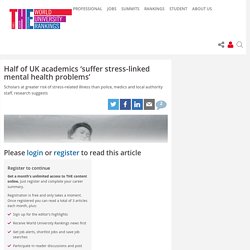
Gail Kinman, professor of occupational health psychology at the University of Bedfordshire, told a forum on staff well-being in higher education at London Metropolitan University on 4 July that some 55 per cent of the 6,439 UK academics she had polled said they had experienced symptoms including depression, sleeping problems and cognitive impairment. In comparison, only 23 per cent of NHS staff report similar difficulties, while the figures for local authority staff and police stood at 42 per cent and 47 per cent respectively, she said. Dualisms in Higher Education: a Critique of Their Influence and Effect - Macfarlane - 2015 - Higher Education Quarterly. Neoliberalism, Marketisation and Higher Education. Tuition fees and the neoliberal university: Responding to the 2017 Higher Education and Research Act.
Simon Choat Labour’s manifesto commitment to abolish university tuition fees has sometimes been criticised as a ‘bribe’ to young voters and the middle classes.
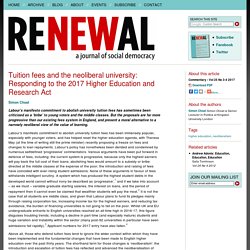
But the proposals are far more progressive than our existing fees system in England, and present a moral alternative to a narrowly neoliberal view of the value of learning. Review: Speaking of Universities, by Stefan Collini. Part new writing and part compilation of reworked speeches and articles, Speaking of Universities is an entertaining addition to that growing genre, “What is to be done with higher education in Britain?”

Celebrated – at least by some – for his well-argued polemics on the state of UK universities, Stefan Collini makes a strong case for universities being the pre-eminent institutions in society for improving the quality of knowledge generation and dissemination. But he pulls no punches in describing how the current sorry state of affairs in the UK academy has come about. Without denying the importance of accountability as an ideal, Collini rails against the counter-productive use of proxy measures for the academic contributions of individual academics, departments and schools, describing from painful personal experience the expensive and time-wasting machinery that surrounds the research excellence framework – doubtless soon to be replicated in the teaching excellence framework.
The Role of the University in a Changing World. How to Serve a Deranged Tyrant, Stoically. Modern History Sourcebook: John Henry Newman: The Idea of A University, 1854. Introductory Note John Henry Newman was born in London, February 21, 1801.
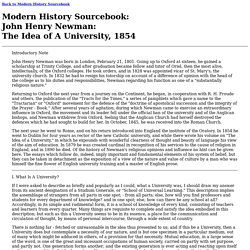
Going up to Oxford at sixteen, he gained a scholarship at Trinity College, and after graduation became fellow and tutor of Oriel, then the most alive, intellectually, of the Oxford colleges. He took orders, and in 1828 was appointed vicar of St. Mary's, the university church. In 1832 he had to resign his tutorship on account of a difference of opinion with the head of the college as to his duties and responsibilities, Newman regarding his function as one of a "substantially religious nature. " Returning to Oxford the next year from a journey on the Continent, he began, in cooperation with R. Timeline of tuition fees in the United Kingdom.
Tuition fees in the United Kingdom were reintroduced for full-time resident Students in 1998, as a means of funding tuition to undergraduate and postgraduate certificate students at universities.
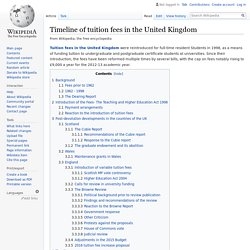
Since their introduction, the fees have been reformed multiple times by several bills, with the cap on fees notably rising to £9,000 a year for the 2012-13 academic year. Background[edit] First gender pay gap data paints UK universities in poor light. Men are being paid significantly more per hour, on average, than their female colleagues at many of the UK’s largest and most prestigious universities, new data reveal.
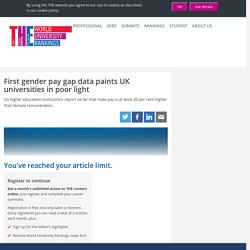
So far, about one-third of British higher education institutions (46) have submitted their gender pay gap data ahead of the national deadline of 4 April, by which time every employer with more than 250 staff must declare its figures. Of the universities to submit so far, six report a gap of more than 20 per cent between average male and female pay. Royal Holloway, University of London, fares particularly badly, with women paid a mean average of 27.2 per cent less per hour, and a median average of 33.8 per cent. LewisandHolloway2018. The History of Education in England - Documents.
Documents Archive The documents are listed chronologically under the following headings: Reportsalmost all the important reports on education in England and Wales since 1900 Other Documentsa selection of DES and HMI publications, government circulars, speeches etc Official PapersGreen papers (discussion documents) and White papers (proposals for legislation) etc Booksa handful of historic texts. The marketisation of mass education in England: a brief history « disgruntled teacher. The following essay is 6000 words long so make yourself a cup of tea!
[This article is an exploration of the forces shaping current educational policy and practise in England in 2015. It is focused on primary schooling (3-11 years old). There is little reference to the UK as a whole because Scotland, Wales and Northern Ireland all remain more committed to the concept of community-based comprehensive schooling i.e. a less ‘marketised’ model.] Education in England - Timeline. Education in England: a historyDerek Gillard first published June 1998 this version published May 2018 © copyright Derek Gillard 2018Education in England: a history is my copyright. University’s ‘60:60:60’ rule fuels fears over degree inflation. Staff at a Russell Group university have been told that they will face investigation over their grading if they award average marks lower than a 2:1. In an email seen by Times Higher Education, lecturers at Queen Mary University of London’s School of Business and Management are told that they must remember what is called the “60:60:60 principle” when assessing students’ work.
With 60 now widely used as the threshold for an upper second – often referred to, along with firsts, as a “good degree” – the memo reminds module organisers who “return marks for any element of assessment where the average mark is below 60 and/or fewer than 60 per cent of the students receive a mark of more than 60 will be asked to explain why this is the case”. The email advised that “60:60:60 is not an aspirational target for marks” but is the “minimum threshold for further investigation” by moderators and “if necessary by the exam board chair as candidate assessments for scaling”.
The teaching excellence framework can enhance academic careers. 2017. Tuition fees: Theresa May challenges university costs. Buzzwords ‘helped universities get gold in the TEF’ Stefan Collini · Who are the spongers now? · LRB 21 January 2016. TEF results - Who moved up and who fell down? Work-life balance survey 2018: long hours take their toll on academics. The fatal flaw of neoliberalism: it's bad economics. Anti-university narrative ‘politically motivated’, say UK v-cs. How academics can help ensure students’ wellbeing. Lire.amazon. ‘If you look at me like at a piece of meat, then that’s a problem’ – women in the center of the male gaze. Feminist Poststructuralist Discourse Analysis as a tool of critique: Critical Discourse Studies: Vol 15, No 1.
Gibbs final manual 1. Tossing and turning: what keeps university staff awake? The sector reshuffle is only adding to the higher education kerfuffle. Write an abstract Part: 1. Universities Critical partners in building sovereignty. CL 37/2017. Brexit witch-hunt against universities reveals the right’s paranoid thinking. Stefan Collini reviews ‘Securing a Sustainable Future for Higher Education’ by Lord Browne et al · LRB 4 November 2010.
Stefan Collini reviews ‘Everything for Sale’ by Roger Brown, with Helen Carasso and ‘The Great University Gamble’ by Andrew McGettigan · LRB 24 October 2013. Stefan Collini · Who are the spongers now? · LRB 21 January 2016. Coding Part 2: Thematic coding. Predatory conferences ‘now outnumber official scholarly events’ Postgraduate Taught Experience Survey Report 2017. TESConnections. Danny Dorling predicts ‘local nationalisation’ of UK universities. Csd thesis template 9th draft. Jo Johnson 'no platforms' no platform. TheoriesofET8. Tory review of tertiary funding could bring ‘price competition’ Timeshighereducation. Differential experiences of time in academic work: How qualities of time are made in practiceTime & Society - Nicola Spurling, 2015.
‘Excellence’ and Exclusion: The Individual Costs of Institutional Competitiveness. PDF000103. Ontological and Epistemological Foundations of Qualitative Research. 10.1.1.901.708. Background_document_to_Symposium_ITEL-FINAL. ESU comments on a proposal for a European Area of Skills and Qualifications - ESU Online. Higher education is about more than jobs. Don't fall into the rankings trap when assessing a university. Publications:Focus on: Do international university rankings serve a useful purpose. Introduction Moral Boundaries Redrawn. Hawaii paper. University staff will be held to ransom by student consumers.
Inside Corporate U women in the academy speak out pages 247 264. Writing from below Hussey 2015. Ng Bisaillon Webster 2017 Blurring the Boundaries. Navigating the Politics of Fieldwork Using Institu. Paper Clarity bordering on stupidity. Alfred Schutz (Stanford Encyclopedia of Philosophy) Hekman. The Conversion of a Skeptic: My Journey into Online Teaching, Part I. Voices_From_the_Margins_The_Regulation_of_Student_ Essay on the meaning of teaching excellence in higher education. Institutional-Ethnography-A-Sociology-For-People. Universities need to be accountable—but to what standards? What will change under the Higher Education and Research Act? Positivism & Post-Positivism. Disciplined writing. 247862E. What the experts make of the higher education white paper. The Guardian view on the higher education white paper: the customer is always ripe – for fleecing.
Bill stages — Higher Education and Research Bill 2016-17. General election 2017: the biggest threat to the HE Bill since it was introduced. Physical space, social space and habitus. TEF Project Board ToR January 2017 v2. TEF commission letter. GLOBAL TEACHING EXCELLENCE AWARDRecognising the world's best institutions. Zurawski Cheryl 184843104 PhD EDUC Spring2013. Society for the Study of Social Problems. Ethnography. 10.